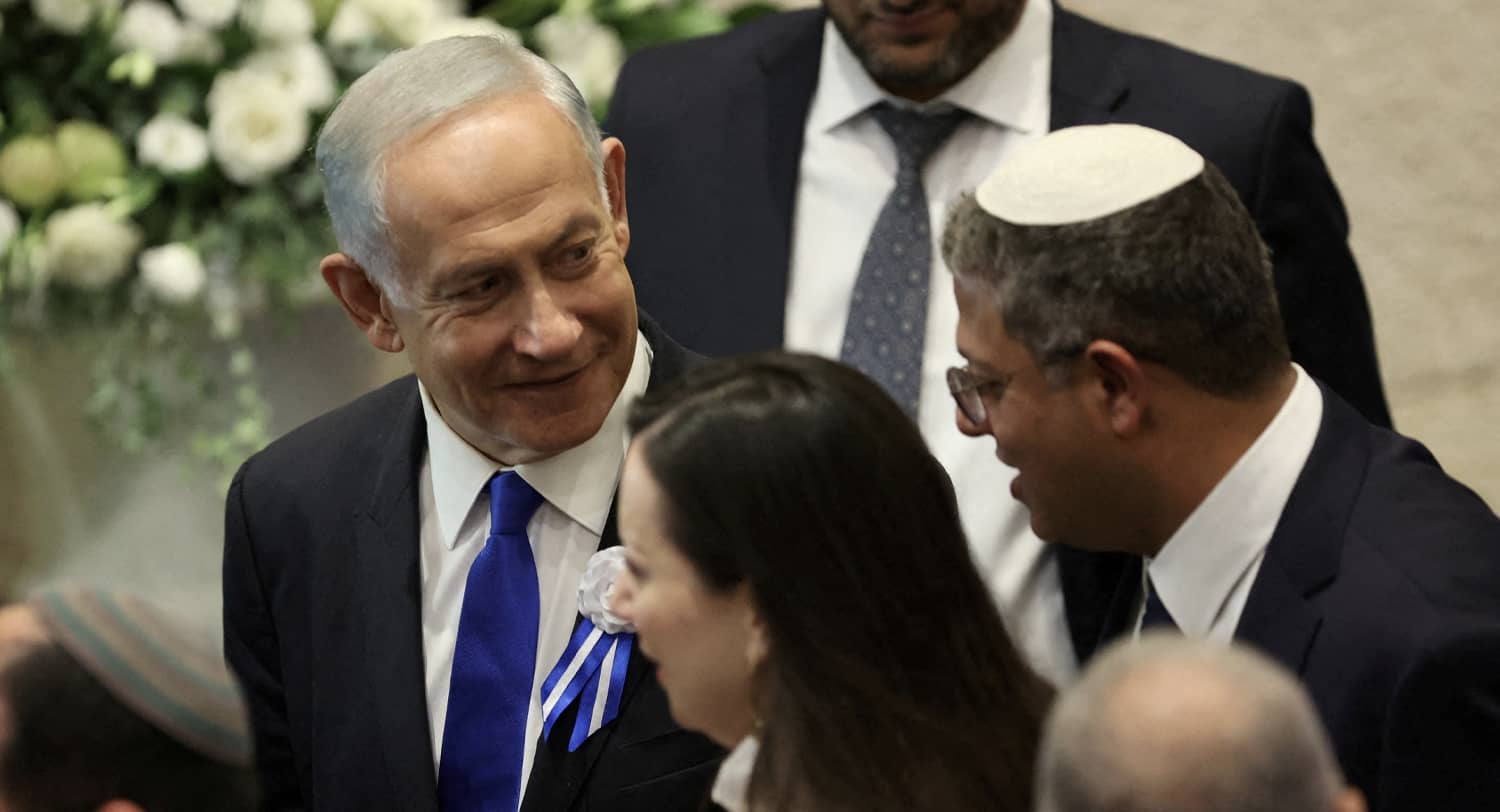A magical moment is recalled in a well known Israeli song (sung by Yehudit Ravitz in 1979): “You took my hand in yours and told me, let’s go down to the garden—the things you see from there are not what you see from here.” A generation later, in 2005, the refrain “what you see from there is not what you see from here” became a political catchword. Prime Minister Ariel Sharon used it to explain how he, a leader of the far right, had decided to pull the Israeli military out of Gaza, violating electoral campaign promises and uprooting thousands of Jewish settlers for what he saw as strategic reasons. From “there”—the prime minister’s office—you see things from a perspective quite different from that of an aspiring political firebrand.
The song’s refrain appears to be playing in the background of the current coalition negotiations. In theory, forming a new government should have been simple: Netanyahu has a parliamentary majority of like-minded right-wing parties between his own Likud party, two ultra-Orthodox parties traditionally loyal to his bloc, and three hardline nationalist religious factions united as a religious Zionist camp. But instead of a meeting of minds, the process has proven to be harder than expected. The push and pull among the coalition partners reflects their suspicion that once Netanyahu is “there”—sitting behind the prime minister’s desk—he will no longer be the ultra-nationalist they want him to be.
True, Netanyahu was raised on the views of Ze’ev Jabotinsky, founder of the Revisionist (i.e., ultra-nationalist) wing of the Zionist movement. Benzion Netanyahu, the prime minister’s father, had served as editor of Revisionist periodicals and as secretary to Jabotinsky. As prime minister, Netanyahu was known as a fierce protector of Israel’s security and rights, who was not given to flights of fancy about peace with the Palestinians. And yet he is very cautious, never trigger-happy, and acutely aware—as someone who lost a brother in combat—of the costs of conflict. He is also a realist, well informed of Israel’s need to take American views into account (and indeed, to keep tensions with Europe within the bounds that allow for significant Israeli exports to European markets). Moreover, in recent years he reincarnated himself as Israel’s supreme diplomat. He led efforts to cement links with the nations of the Eastern Mediterranean, Africa, Latin America, and, above all, India and other key Asian players. Ultimately, this led to the Abraham Accords with Morocco, the United Arab Emirates, Bahrain, and others.
Once “there” as prime minister he would be obliged to listen and take into account the firm views of the American administration on matters pertaining to the Palestinians and to Israel’s conduct in the West Bank and East Jerusalem. He would also need to be attentive to the grave concerns of many American Jews regarding what they see as the tightening grip of radical modern Orthodox and ultra-Orthodox political parties on Israeli policy. His quest to sustain, deepen, and broaden the Abraham Accords—with his sights set on Saudi Arabia—would also impose restraints on the Palestinian front (while at the same encouraging a pro-active policy against the Iranian regime).
Hence, his coalition partners are determined to bind his hands in advance.
First, they propose to carve up key ministries, especially the ministry of defense, which under international law is the effective sovereign in areas under Israel’s military occupation in the West Bank. Parts of the defense minister’s portfolio are to be held by an appointee of the religious Zionist camp. Similarly, key functions of the Ministry of Education will be scattered among several other ministerial or deputy-ministerial positions held by Netanyahu’s partners, thus limiting the ability of a Likud minister of education to control educational content. This aspect of the emerging coalition agreement has already drawn fierce criticism, including from city mayors seeking to reassure their secular electorate that their children will not be force-fed a ultra-nationalist or Orthodox agenda.
Second, they insist on specific language in the inter-party coalition agreement about the scope of authority, pending legislation and administrative reforms, particularly regarding the judicial system and the Supreme Court, language that would presumably govern the conduct of the next government. Netanyahu wanted a minimalist text and a quick move to the allocation of ministerial portfolios, but his partners were unwilling to agree.
A third complicating factor is the need to pass specific legislation that would clear Aryeh Deri, leader of the ultra-Orthodox Shas party, to serve in the cabinet despite a recent conviction on tax evasion. Itamar Ben Gvir, the right-wing rabble-rouser now designated as minister for national (i.e., internal) security, has his own personal piece of legislation on the agenda, one that would give him operational control over the police. The present government’s attorney general has already raised doubts about the constitutionality of this act, but her objection is likely to be overruled.
Will the country now be run by uncontrollable hard-right activists who will, in pursuit of their agenda, push the limits in the West Bank and Jerusalem? The final say will be with Netanyahu and the small group around him: defense minister, foreign minister, national security adviser, the military chief of staff and the heads of the intelligence agencies. Only after the team is in place can we fully assess what will be the state of play in the push and pull over Israel’s policy.

